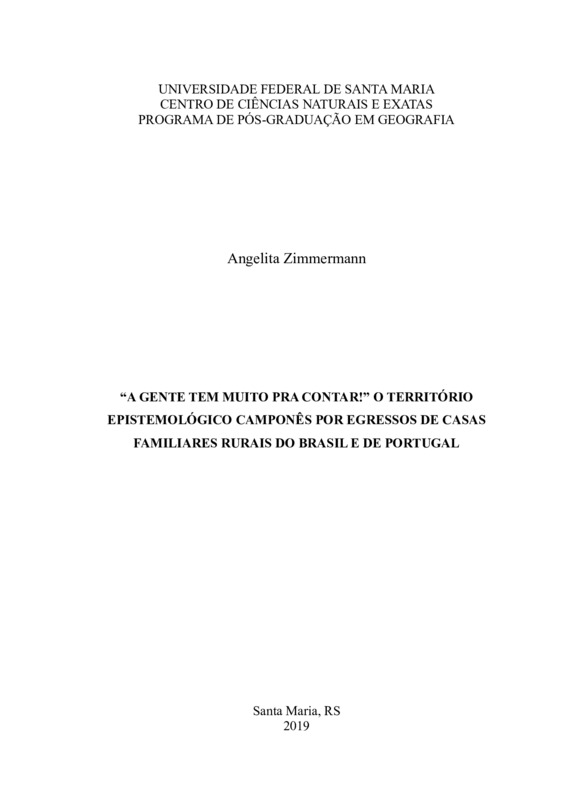-
Título
-
"A GENTE TEM MUITO PRA CONTAR!" O TERRITÓRIO EPISTEMOLÓGICO CAMPONĘS POR EGRESSOS DE CASAS FAMILIARES RURAIS DO BRASIL E DE PORTUGAL
-
lista de autores
-
ANGELITA ZIMMERMANN
-
Resumo
-
Os Centros Familiares de Formação por Alternância (CEFFA) têm se constituído coletivamente como um movimento de luta e resistência frente às imposições do capital e do modelo político-econômico do agronegócio. Juntas, as Casas Familiares Rurais e sua produção territorial contribuem para a formação do que chamamos de território epistemológico camponês. Desde a origem, na França, em 1935, essa pedagogia e seus processos formativos têm alargado as possibilidades de permanência e ação dos jovens no campo, pelas relações político-sociais estabelecidas nos lugares de atuação das escolas que, por meio da interrelação educação e trabalho, integram uma práxis transformadora na vida concreta destes sujeitos sociais. Compreendemos a experiência de vida camponesa a partir dos conceitos de sociologia da ausência e sociologia da emergência como possibilidade de reconhecimento das epistemologias do modo de vida camponês, que vem sendo negado como ciência moderna pelo capital. O propósito deste estudo foi compreender as transformações percebidas na (re)produção da vida dos egressos da Escola de Ensino Médio Casa Familiar Rural Três Vendas (CFRTV) – Catuípe, Brasil, e da Casa Escola Agrícola Campo Verde (CEACV), Póvoa do Varzim, Portugal, reconhecendo e visibilizando a ecologia de saberes, que une conhecimentos científicos àqueles conhecimentos artesanais/ancestrais, originados da luta e resistência cotidiana destas Epistemologias do Sul. Esta pesquisa, em uma abordagem qualitativa, além do aporte teórico e documental, instrumentalizou-se em entrevistas, vivências e observações, nas escolas e nas moradias dos entrevistados de cada um dos países. Espera-se, a partir da tradução intercultural entre os campos estudados, no Brasil e em Portugal, ampliarmos a compreensão das contradições da questão agrária, do processo formativo destes CEFFA e sua relação com a vida dos egressos. Com isso, reconhecermos os conhecimentos sobre a complexa relação entre formação e territorialização do jovem no campo, inserida na luta de classes e no enfrentamento das condições de trabalho e vida no campo da contemporaneidade.
-
Abstract
-
The Family Centers of Alternation Formation (CEFFA) have been collectively constituted as a movement of struggle and resistance against the impositions of capital and the agribusiness political-economic model. Together, the Rural Family Houses and their territorial production contribute to the formation of what we call the peasant epistemological territory. Since its origin in France, in 1935, this pedagogy and its formative processes have expanded the possibilities of permanence and action of young people in the countryside, through the political-social relations established in the schools' places of action, which, through the interrelation between education and work integrate a transformative praxis into the concrete life of these social subjects. We understand the experience of peasant life from the concepts of sociology of absence and sociology of emergency as a possibility of recognition of the epistemologies of the peasant way of life, which has been denied as modern science by capital. The purpose of this study was to understand the transformations perceived in the (re) production of the lives of the graduates of the High School Rural Family House Three Sales School (CFRTV) - Catuípe, Brazil, and the Campo Verde Agricultural School House (CEACV), Póvoa do Varzim, Portugal, recognizing and visualizing the ecology of knowledges, which unites scientific knowledge to those artisanal / ancestral knowledge, originated from the daily struggle and resistance of these Southern Epistemologies. This research, in a qualitative approach, besides the theoretical and documentary contribution, was instrumented in interviews, experiences and observations, in the schools and in the homes of respondents from each country. It is expected, from the intercultural translation between the studied fields, in Brazil and Portugal, to broaden the understanding of the contradictions of the agrarian question, the formative process of these CEFFAs and its relationship with the lives of the graduates. Thus, we recognize the knowledge about the complex relationship between formation and territorialization of young people in the countryside, inserted in the class struggle and in the confrontation of working and living conditions in the contemporary field.
-
Palavras Chave
-
EGRESSOS DA CFRTV E CEACV
-
EDUCAÇĂO DO CAMPO
-
TERRITÓRIO EPISTEMOLÓGICO CAMPONĘS
-
EPISTEMOLOGIAS DO SUL
-
Key Words
-
EGRESS OF CEACV AND CFRTV
-
RURAL EDUCATION
-
PEASANT EPISTEMOLOGICAL TERRITORY
-
SOUTHERN EPISTEMOLOGIES
-
Tipo
-
DOUTORADO
-
Universidade
-
UNIVERSIDADE FEDERAL DE SANTA MARIA
-
Data
-
2019
-
Páginas
-
385
-
Localização
-
Biblioteca Digital de Teses e Dissertações (BDTD UFSM)
-
Orientador
-
ANE CARINE MEURER
-
Programa
-
Programa de Pós-Graduação em Geografia e Geociências
-
Sigla Universidade
-
UFSM
-
Área de Concentração
-
ANÁLISE AMBIENTAL E TERRITORIAL DO CONE SUL
-
Língua
-
Português
-
email
-
\N

